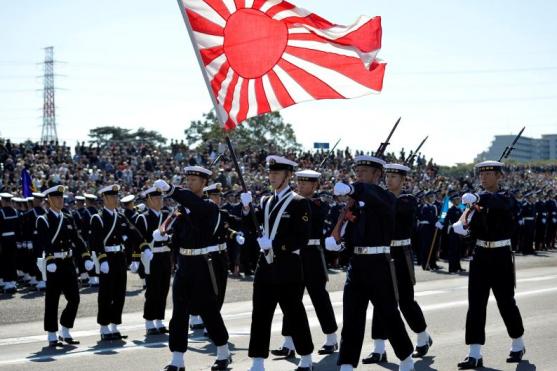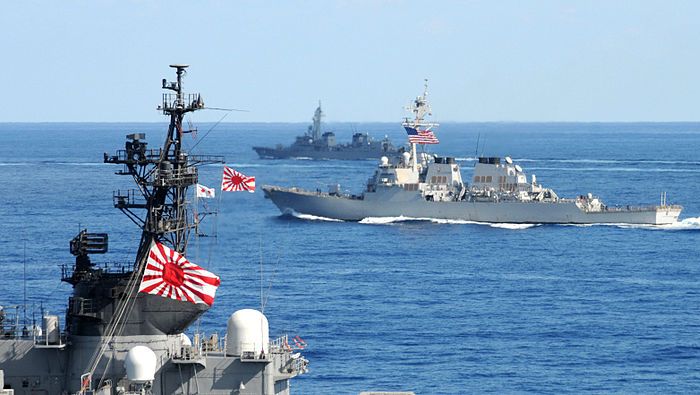By Justin Chock
Recently, Japan’s parliament approved a set of historic bills: Japan is no longer limited to only defending its own military hardware, and is now able to use its Japan Self-Defense Force (JSDF) to assist its allies whether through military action or logistical support. The original restriction stems from Article 9 of Japan’s constitution, stating that “the Japanese people forever renounce war as a sovereign right of the nation and the threat or use of force as means of settling international disputes.” These bills now reinterpret that passage.
The first bill, as explained by the Japan Times, amends ten laws, and includes lifting the previous restrictions on the JSDF’s collective self-defense capability (the ability to defend an ally under attack rather than one’s own units). Collective self-defense will be limited to three conditions however: Japan, or a close ally, must be attacked with a result threatening Japan’s survival and posing a clear danger to people; force must be the only appropriate means available to repel the attack; and the force is the necessary minimum to negate the aforementioned threat.
The second bill is a permanent law that allows Japan to deploy the JSDF overseas to support UN-authorized military operations by providing logistic support (which Japan previously conducted with the US).
But now that the long-anticipated bills are through, how does this change the strategic calculus in East Asia? Will the maritime territorial disputes over the Senkaku/Diaoyu Islands or the South China Sea ignite over a stronger, more capable Japan?
I argue that while the bills strengthen Japan’s alliances, especially the US-Japan Alliance, this change will not lead to conflict as the bill’s opponents suggest.
From Renouncing War to Proactive Peace
A brief look at the history of Japan’s pacifist constitution is in order for understanding these recent developments. During the US occupation of Japan following World War II, America held two complimentary worries in East Asia: a remilitarized Japan and the onset of the cold war, including a stronger Soviet Union and the increasingly popular Japanese Socialist Party. The solution to both concerns was to maintain an American foothold in Japan as was the same in Germany.
But the US presence was in many ways, like the European case, invited; both General MacArthur and the newly appointed Prime Minister, Kujiro Shidehara, agreed that the introduction of the Article 9 peace clause to Japan’s new constitution would be to the benefit of all (although the originator of the idea is still under dispute). Japanese foreign policy soon adapted to Article 9, as seen by Japan’s newly elected government under Prime Minster Shigeru Yoshida. His “Yoshida Doctrine” relied on the US for security while Japan focused on its economy, and subsequent administrations did not stray far from this baseline (for example, the “Fukuda Doctrine” reiterated Japan’s peaceful orientation while adding a focus on development assistance).
But the most recent framework for Japan’s foreign policy, the “Abe Doctrine,” took a dramatic shift. Under Prime Minster Abe, Japan would no longer be held back by concerns over remilitarization, and would deepen engagement with the US while globally emphasizing “value-oriented” diplomacy. Japan as a “Proactive Contributor to Peace” expanded its defense organizations in various ways during the previous few years through the second-ever update of the US-Japan Defense Cooperation Guidelines (since its last version in 1997), the creation of a National Security Council modeling the American version, the update of the Japan National Defense Program Guidelines, and the recent expansion of Japan’s Defense Equipment and Technology Transfer program, among many other initiatives.
But the projects named above, as expansive for Japan’s defense policy as they were, all came in 2013. Even the 2015 bills were simply a formality to an already accepted change in interpretation by the Japanese cabinet in July 2014, and as noted earlier, there are many restrictions with the bills that keep the JSDF within its typical roles. Thus Japan’s security apparatus was already significantly transformed before any voting took place in the parliament, and the bills are not in and of themselves groundbreaking when seen in the backdrop of all of the other recent changes.
The Chinese Dragon’s Puff?
Supporters in Japan often argue that the bills are necessary in light of China’s growth as an Asian power, to include its military modernization and increasingly assertive foreign policy. So as a response, will China view the Japanese bills as the beginning of a security dilemma with its neighbor and force an East Asian arms race?
The answer is “not likely.” China’s response was actually quite muted. The Chinese government’s solemn but simple “urge” seems beneath its regional power standing, especially when directed to a country that some don’t even rank in the Top 5 militaries in Asia, and even more so when the US comparatively receives “strong opposition” for simply publishing a routine, annual report on China’s Military and Security developments.
But China’s restrained statement supports the idea that, despite anti-Japanese nationalistic protests and extravagant military parades commemorating WWII (read: “War of Resistance Against Japanese Aggression”), China’s focus isn’t Japan. If anything, the US and its Southeast Asian partners like the Philippines are China’s true focus with artificial island building in the South China Sea and ships sailing within 12 nautical miles of the US coast in Alaska.
So if China isn’t overly concerned with these bills nor with Japan itself, what do they, if anything, mean for Asia-Pacific security?
Shifting Security Tides?
First, the bills seem to make few changes to the JSDF’s defensive orientation. As noted earlier, the reinterpretation has already been in effect for a year, and although much has happened since July 2014, the JSDF’s operations have remained fairly routine. With the bills, the options for military action increase, but the probability of their implementation remains quite low and only toward the higher-end of the spectrum of conflict. Fears of a remilitarized Japan that stem from the post-WWII era seem similarly unlikely at this point, and a Sino-Japanese arms race seems similarly unlikely given China’s minimal response.
Second however, Japan’s international involvement will become increasingly global in nature in the “proactive” way that Abe hopes. The legal opening to participate in UN operations will allow Japan to send troops to a wider expanse of the globe as a part of these peacekeeping missions. Similarly, seeing the bills as strength for the US-Japan alliance could lead decision makers to begin the proposed joint patrols in the South China Sea, a move to China’s dismay. Japan playing a larger military role in the Asia-Pacific would, in theory, provide a counterweight to recent increases in Chinese military power (although perhaps the upcoming troop reduction is signaling the end of this growth), but it could just as easily create opportunities for friction that lead to an undesired crisis. The implications of a more proactive Japan are up to the future, but the idea of Japan operating in a wider expanse of the globe is quite certain.
Third, the US-Japan Alliance is receiving a legal and psychological upgrade. In addition to Japan’s new capabilities to include intercepting a missile bound for a US warship, the legislation mitigates America’s historic complaint of Japan not pulling its weight in the alliance. In addition, working alongside JSDF forces during UN operations or increased bilateral training supporting a stronger US-Japan Alliance will have a psychological effect on these countries. Trust is already increasing, as 2015 Pew polls show, “two-thirds of Americans trust Japan a great deal or a fair amount and three-quarters of Japanese say they trust the United States.” This trust will only increase as the two forces work even closer together.
Lastly, the political process for reinterpretation is somewhat worrying from a Japanese domestic legal order standpoint. The current bills still came at a substantial political cost; PM Abe’s approval rating now stands at 40 percent, with his disapproval rating at 47 percent. The bill’s disapproval rating was 54 percent (although the cause was linked to a perceived lack of explanation from the government) with only 31 percent approving, and protests outside the building further demonstrated the depth of opposition. The resulting physical “scuffle” within the parliament itself during the signing was also rare for Japanese politics. Despite all of the pushback, the bills still passed, once again demonstrating how Japan is historically adept at reinterpreting rather than amending its constitution. Technically speaking however, the constitution’s Article 96 outlines the amendment process, and requires both a two-thirds vote in the parliament and a majority vote by the public, with no such amendment ever occurring in the constitution’s history. While these current bills maintain the East Asian balance of power, future legislation may go too far; the potential still exists for a future government to reinterpret the constitution through this same process in a way that inadvertently starts a security dilemma.
Admittedly though, reinterpretations aren’t inherently bad. Reading a strict, literal interpretation of Article 9’s stipulation that “land, sea, and air forces… will never be maintained” would have rendered the JSDF unconstitutional a long time ago. Yet the reinterpretation (or rather the “self-defense” title) leading to their creation turned out to be the right decision as the JSDF continues to prove itself in numerous ways to be an incredibly beneficial force (the discussion of the JSDF itself to be saved for another day). Thus on the point of reinterpretations, the responsibility will be up to the Japanese public and government to continue striking just the right balance of force to maintain security for all.
Only time will tell whether the bills will make Abe’s “proactive contribution to peace” or create regional friction. But despite the domestic uproar in Japan over the bills’ passage, the Asia-Pacific relations as a whole looks set to proceed on its prior course.
Justin Chock is currently an MPhil in International Relations student at Oxford University. The views expressed in this article are his own.


